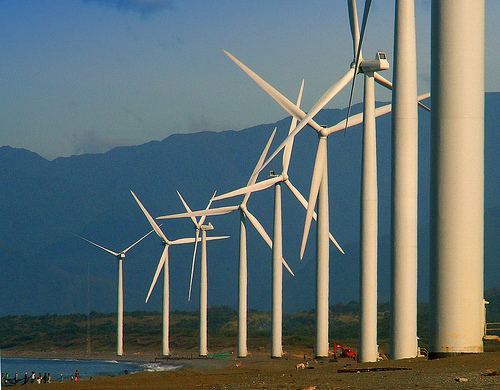Blowing in the Wind: Europe’s Energy Debate Has Stalled

Please note that we are not authorised to provide any investment advice. The content on this page is for information purposes only.
31 August 2011.
The future of energy in Europe is trapped in a political quagmire. As a result of the political bickering among opposing views in European parliaments, little is being done to address the energy problems for the future. Will a compromise be reached?
31 August 2011.
The future of energy in Europe is trapped in a political quagmire. As a result of the political bickering among opposing views in European parliaments, little is being done to address the energy problems for the future. Will a compromise be reached?
I might be simplifying things but the debate about the future of energy seems to be largely divided on political lines. On one extreme, you have “dark greens” and their industrial hangers-on who favour a continued push into renewable energy – wind, wave, tidal and solar – irrespective of whether such energy is viable without state subsidies. On the other extreme is a more right-wing group who are adamant the lights are going to go out in Europe in about 2020 unless we build the next generation of nuclear reactors (who, by the way, also kind of expect the form of energy they champion to receive state handouts).
The debate is intensifying as the deadline approaches.
A further dimension was added in March, when several countries started re-evaluating their commitment to nuclear power in the wake of the Fukushima disaster. All sources of power to the Japanese plant’s cooling systems were taken out by the March 2011 tsunami, which led to core meltdowns in three of the Tepco-owned plant’s six nuclear reactors. According to US National Public Radio, workers and engineers have since been struggling to halt radioactive leakage into the ocean, air and soil around the plant.
This disaster prompted German chancellor Angela Merkel to decide in May that Germany would turn its back on nuclear energy. Merkel, a trained scientist with a PhD is physics, said Germany’s 17 nuclear reactors would close by 2022. Together with the ending of nearly €200bn in subsidies paid out to nuclear since the 1950s, the hope is this will give further impetus to her country’s already successful renewables sector. Wind, solar, tidal etc. currently generate 17% of Germany’s total power output, and Merkel’s coalition government believes this can be lifted to 80% by 2050.
However, the industrialists of the Ruhr are up in arms. They believe that phasing out of nuclear power is going to cause energy costs to go through the roof and render their exports less and less competitive. There’s also concern about the level of subsidies being paid out to the renewables sector, especially the uncommercial solar power sector. In total, German electricity consumers will pay €13 billion in subsidies to the renewable sector this year, according to Der Spiegel.
In the UK, antipathy to wind farms, and the subsidies without which many would be unviable, seems even more outspoken. The Conservative MEP Struan Stevenson recently went on the warpath with a powerful anti-wind energy tirade. He opened a speech in his Ayrshire constituency with the words:
[quote]”Chambers Dictionary defines the word ‘rape’ as meaning violation, despoliation or abuse. I have chosen this evocative word as the title of my presentation this evening … as [it is] an accurate description of the scandal of industrial wind developments in our nation today.”[/quote]He went on to detail why, in his view, subisidizing the wind energy sector is economic lunacy, since it only enriches the idle rich (landowners etc.) while pushing up energy bills for ordinary people. In a write-up of the speech in The Scotsman, financial journalist Bill Jamieson (who has never been a massive fan of wind farms, by the way) provided a useful synopsis, praising the speech as one of the most powerful statements yet made against Scotland’s massive wind farm “scramble”.
[quote]”It was a classic political speech with a delivery resonant of a bygone age: not a cheap unresearched soundbite to a camera but a well-researched and thought-out attack, delivered to a constituency audience and in a manner evoking the age of Gladstonian campaigning.”[/quote]The only criticism that the governing, pro-wind-energy Scottish National Party could muster was over Stevenson’s use of the word “rape”. Bristling with outrage at Stevenson’s lack of political correctness the MSP Sandra White raised a motion in the Scottish Parliament, claiming that the MEP’s language had been “unacceptable and deeply insulting” to people who have been sexually assaulted and called on “all decent-minded people” to disassociate themselves from Stevenson’s “disgraceful remarks.”
In my view White either missed the point or was being deliberately obfuscating here. Stevenson ended his speech by examining other energy options, explaining that it would be possible to save 75% of energy used in the UK if households and industrial users were more efficient (for example, if triple glazing and roof insulation was mandatory on new homes). He also said that he favours investment in sunrise technologies including hydrogen power, which is already becoming mainstream in Germany. In the meantime, Stevenson said “it is sheer madness to turn our backs on nuclear power”. I suspect this is a debate that is going to run and run.
By Ian Fraser
Ian Fraser, a journalist since 1988, is working on programmes about the banking and financial crisis for the BBC. He writes about business and finance for the Financial Times, the Sunday Times, the Independent on Sunday, the Daily Mail, and the Mail on Sunday. Since 2009, Fraser has been a visiting lecturer in financial journalism at the University of Stirling.
Does over-reliance on wind energy risk the lights going out across Europe? is republished with permission from QFinance Blog.




